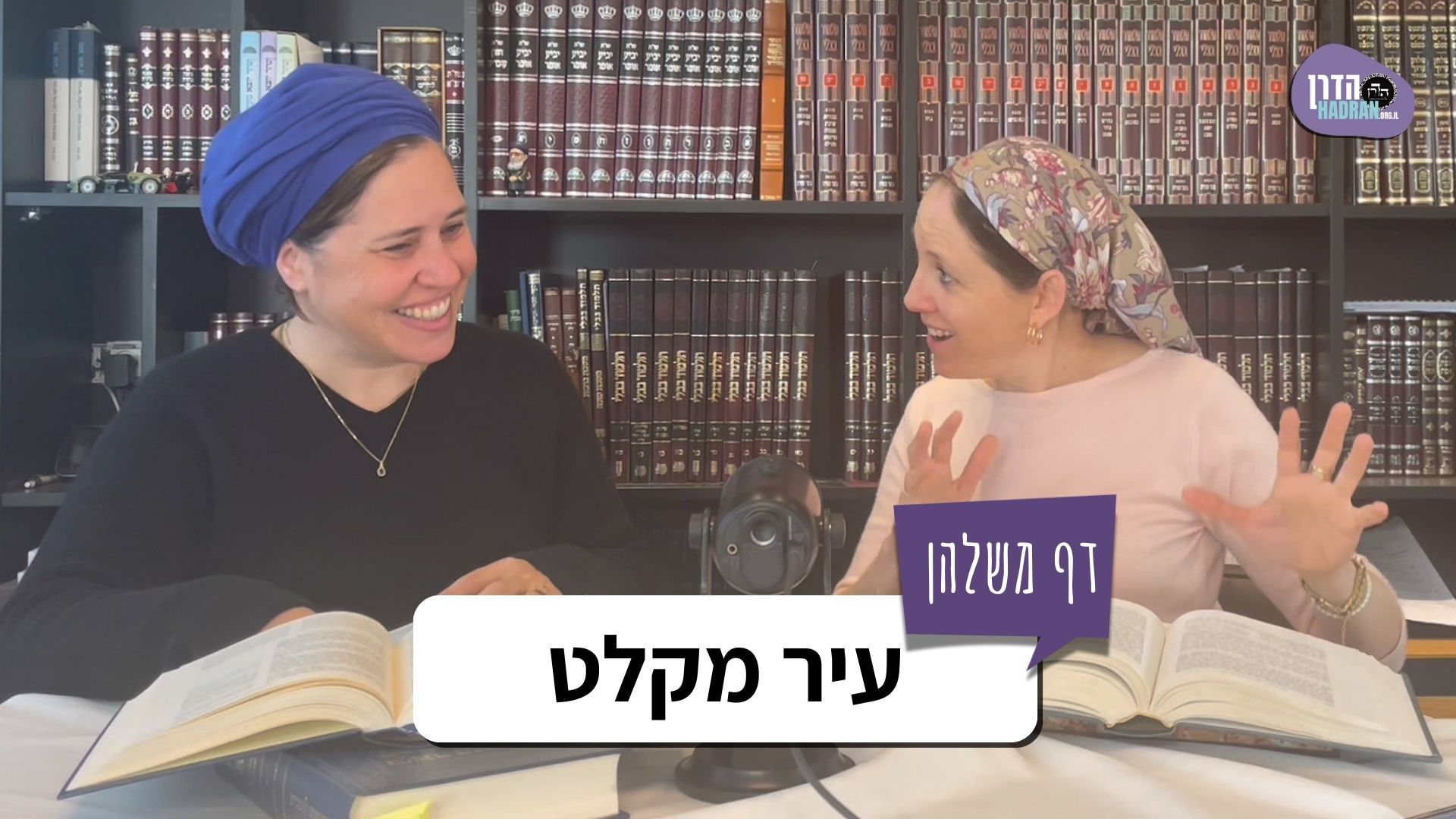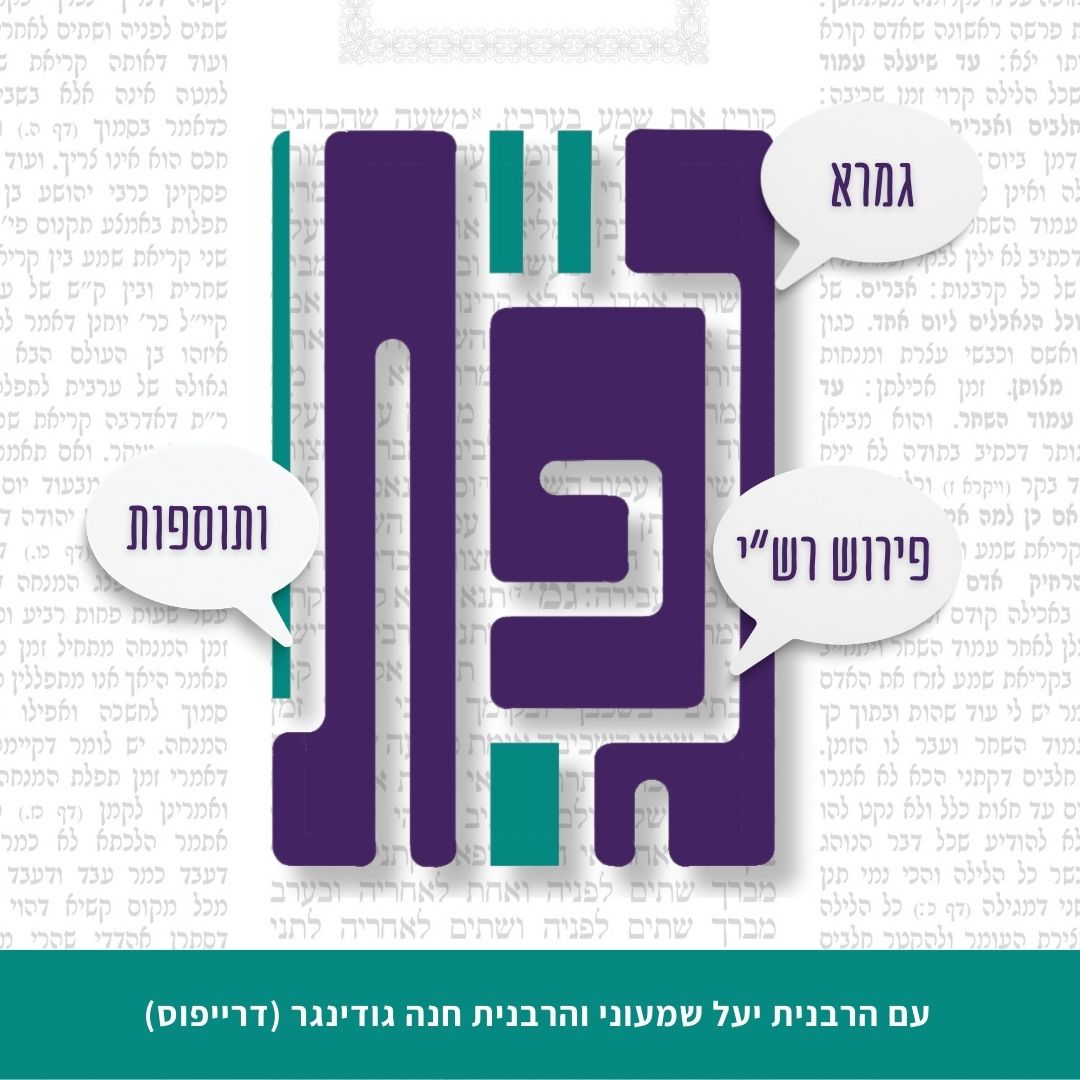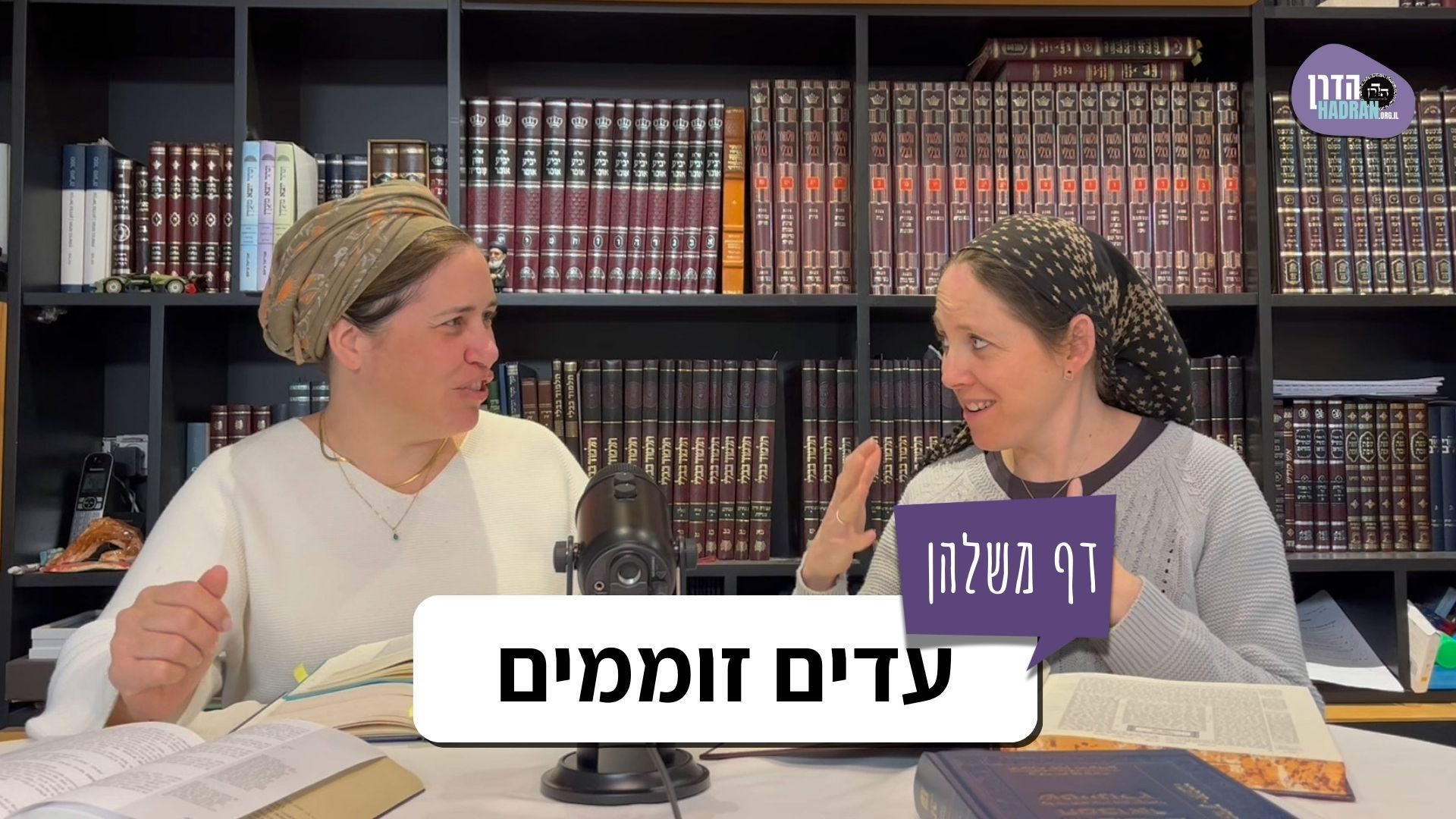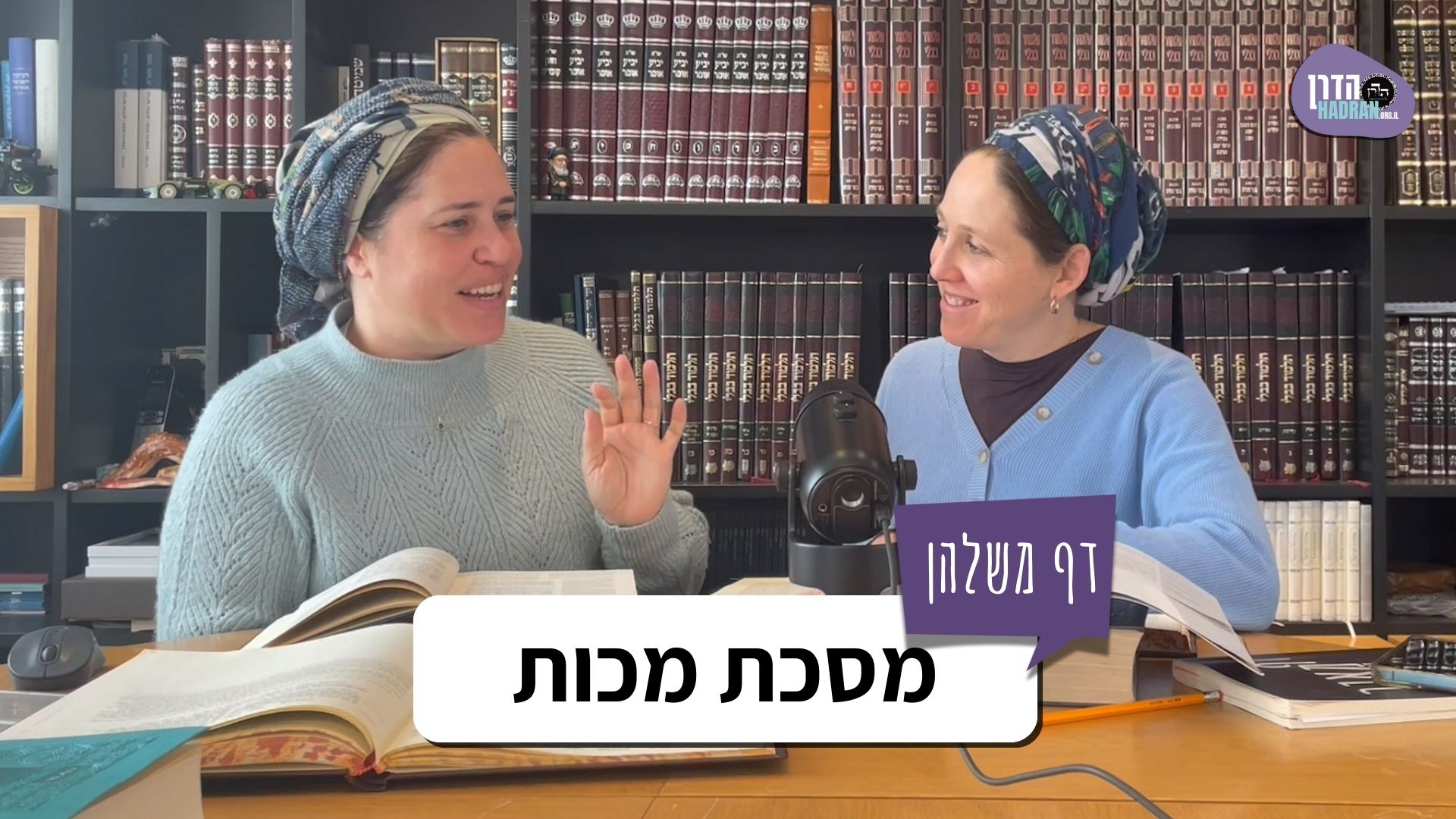מכות ח
וְהָאָמַר רַב יִצְחָק בְּרַבִּי יוֹסֵף אָמַר רַבִּי יוֹחָנָן: רַבִּי, וְרַבִּי יְהוּדָה בֶּן רוֹעֵץ, וּבֵית שַׁמַּאי, וְרַבִּי שִׁמְעוֹן, וְרַבִּי עֲקִיבָא, כּוּלְּהוּ סְבִירִי לְהוּ יֵשׁ אֵם לַמִּקְרָא! הַיְינוּ דְּקָאָמַר לְהוּ ״וְעוֹד״.
But doesn’t Rav Yitzḥak, son of Rabbi Yosef, say that Rabbi Yoḥanan says: Rabbi Yehuda HaNasi, and Rabbi Yehuda ben Roetz, and Beit Shammai, and Rabbi Shimon, and Rabbi Akiva all hold that the vocalization of the Torah is authoritative, not the manner in which it is written? How can Rav Ḥiyya bar Ashi ascribe Rabbi Yehuda HaNasi’s ruling to the contrary opinion? The Gemara answers: That is the reason that Rabbi Yehuda HaNasi said to the Rabbis: And furthermore. Rabbi Yehuda HaNasi said to them: If the tradition of the manner in which the verses in the Torah are written is authoritative, that supports my interpretation of the verse; if not, there is an additional proof.
אָמַר רַב פָּפָּא: מַאן דִּשְׁדָא פִּיסָּא לְדִיקְלָא וְאַתַּר תַּמְרֵי, וַאֲזוּל תַּמְרֵי וּקְטוּל, בָּאנוּ לְמַחְלוֹקֶת דְּרַבִּי וְרַבָּנַן. פְּשִׁיטָא! מַהוּ דְּתֵימָא, כְּכֹחַ כֹּחוֹ דָּמֵי, קָא מַשְׁמַע לַן.
Rav Pappa said: In the case of one who cast a clod of earth onto a palm tree, and he severed dates from the tree, and the dates went upon a person and killed him, we have arrived at the dispute between Rabbi Yehuda HaNasi and the Rabbis in a case where one was splitting wood and a wood chip flew through the air and killed a person. In that case, Rabbi Yehuda HaNasi deems him liable to be exiled, and the Rabbis deem him exempt from exile. The Gemara asks: Isn’t that obvious? The cases are identical. What novel element is Rav Pappa introducing? The Gemara answers: The parallel between the cases drawn by Rav Pappa is necessary. Lest you say that these severed dates were not propelled by the force of his action but are like an item propelled by a force generated by the force of his action, and even Rabbi Yehuda HaNasi would concede that in that case he is exempt from exile, Rav Pappa teaches us that the dates are considered to have been severed by the force of his action.
אֶלָּא כֹּחַ כֹּחוֹ לְרַבִּי הֵיכִי מַשְׁכַּחַתְּ לַהּ? כְּגוֹן דִּשְׁדָא פִּיסָּא וּמַחֲיֵהּ לְגִרְמָא, וַאֲזַל גִּרְמָא וּמַחֲיֵהּ לִכְבָאסָא וְאַתַּר תַּמְרֵי, וַאֲזוּל תַּמְרֵי וּקְטוּל.
The Gemara asks: But according to Rabbi Yehuda HaNasi, how can you find circumstances of a force generated by the force of his action where he would be exempt from exile? The Gemara answers: It can be found in a case where one cast a clod of earth and it struck a branch of the palm tree, and the branch, propelled by the clod, proceeded to strike a cluster of dates [likhevasa] and severed the dates from the branch they were on and the dates proceeded to kill a person.
מַתְנִי׳ הַזּוֹרֵק אֶבֶן לִרְשׁוּת הָרַבִּים וְהָרַג – הֲרֵי זֶה גּוֹלֶה. רַבִּי אֱלִיעֶזֶר בֶּן יַעֲקֹב אוֹמֵר: אִם מִכְּשֶׁיָּצָאתָה הָאֶבֶן מִיָּדוֹ הוֹצִיא הַלָּה אֶת רֹאשׁוֹ וְקִבְּלָהּ – הֲרֵי זֶה פָּטוּר.
MISHNA: One who threw a stone into the public domain and killed a person is exiled. Rabbi Eliezer ben Ya’akov says: If after the stone left his hand the other person placed his head out into the public domain and received a blow from the stone, he is exempt, as when he cast the stone into the public domain there was no one there.
זָרַק אֶת הָאֶבֶן לַחֲצֵרוֹ וְהָרַג, אִם יֵשׁ רְשׁוּת לַנִּיזָּק לִיכָּנֵס לְשָׁם – גּוֹלֶה, וְאִם לָאו – אֵינוֹ גּוֹלֶה, שֶׁנֶּאֱמַר: ״וַאֲשֶׁר יָבֹא אֶת רֵעֵהוּ בַיַּעַר״ – מָה הַיַּעַר רְשׁוּת לַנִּיזָּק וְלַמַּזִּיק לִיכָּנֵס לְשָׁם, אַף כֹּל רְשׁוּת לַנִּיזָּק וְלַמַּזִּיק לְהִכָּנֵס לְשָׁם. יָצָא חֲצַר בַּעַל הַבַּיִת, שֶׁאֵין רְשׁוּת לַנִּיזָּק וְלַמַּזִּיק לִיכָּנֵס לְשָׁם.
In the case of one who threw the stone into his courtyard and killed a person, if the victim had permission to enter into there, the murderer is exiled, but if not, he is not exiled, as it is stated with regard to the cities of refuge: “And as one who goes with his neighbor into the forest” (Deuteronomy 19:5), from which it is derived: Just as with regard to a forest, the victim and the assailant both have equal permission to enter there, so too, with regard to all places that the victim and the assailant have permission to enter there, the killer is liable. This serves to exclude the courtyard of the homeowner, where the victim and the assailant do not both have permission to enter there. Since the victim had no right to enter his courtyard, the unintentional murderer is exempt from exile.
אַבָּא שָׁאוּל אוֹמֵר: מָה חֲטָבַת עֵצִים רְשׁוּת, אַף כֹּל רְשׁוּת, יָצָא הָאָב הַמַּכֶּה אֶת בְּנוֹ, וְהָרַב הָרוֹדֶה אֶת תַּלְמִידוֹ, וּשְׁלִיחַ בֵּית דִּין.
Abba Shaul says: Another halakha can be derived from that verse: Just as the cutting of wood that is mentioned in the verse is optional, so too, all those liable to be exiled are examples of cases where the unintentional murderer was engaged in an activity that is optional. This serves to exclude a father who strikes his son, and a teacher who oppresses his student, and an agent of the court deputized to flog transgressors. If, in the course of performing the mitzva with which they are charged, they unintentionally murdered the son, the student, or the person being flogged, respectively, they are exempt.
גְּמָ׳ לִרְשׁוּת הָרַבִּים, מֵזִיד הוּא! אָמַר רַב שְׁמוּאֵל בַּר יִצְחָק: בְּסוֹתֵר אֶת כּוֹתְלוֹ. אִיבְּעִי לֵיהּ לְעַיּוֹנֵי! בְּסוֹתֵר אֶת כּוֹתְלוֹ בַּלַּיְלָה. בַּלַּיְלָה נָמֵי אִיבְּעִי לֵיהּ לְעַיּוֹנֵי!
GEMARA: The mishna teaches: One who threw a stone into the public domain and killed a person is exiled. The Gemara asks: If he threw the stone into the public domain, why is he exiled? He is an intentional murderer. He knows that there are generally people in the public domain and is aware that he is likely to harm someone with the stone. Rav Shmuel bar Yitzḥak says: The reference in the mishna is not to one who threw a stone for no reason; rather, it is a case where one is demolishing his wall, and one of the stones struck a person. The Gemara counters: That too is intentional, as he should have examined the other side of the wall to determine if there was anyone there. The Gemara answers: It is a case where one is demolishing his wall at night, when passersby are scarce. The Gemara asks: At night too he is required to examine the other side of the wall to determine if there is anyone there, as although it is uncommon, people are apt to walk through a public domain at all hours.
בְּסוֹתֵר אֶת כּוֹתְלוֹ לְאַשְׁפָּה. הַאי אַשְׁפָּה הֵיכִי דָמֵי? אִי שְׁכִיחִי בַּהּ רַבִּים – פּוֹשֵׁעַ הוּא, אִי לָא שְׁכִיחִי בַּהּ רַבִּים – אָנוּס הוּא!
The Gemara answers: The reference in the mishna is to a case where one demolishes his wall into a scrap heap, where there is no reasonable expectation to find anyone there, as it is located out of the way. The Gemara asks: What are the circumstances of this scrap heap? If it is frequented by the multitudes because it is utilized as a bathroom, he is negligent; if it is not frequented by the multitudes, although it is a public domain in the sense that it is not private property, he is a victim of circumstances beyond his control, as there was no reason to consider the possibility that someone was there.
אָמַר רַב פָּפָּא: לָא צְרִיכָא אֶלָּא לְאַשְׁפָּה הָעֲשׂוּיָה לִיפָּנוֹת בָּהּ בַּלַּיְלָה, וְאֵין עֲשׂוּיָה לִיפָּנוֹת בָּהּ בַּיּוֹם, וְאִיכָּא דְּמִקְּרֵי וְיָתֵיב. פּוֹשֵׁעַ לָא הָוֵי – דְּהָא אֵינָהּ עֲשׂוּיָה לִיפָּנוֹת בָּהּ בַּיּוֹם, אוֹנֶס נָמֵי לָא הָוֵי, דְּהָא אִיכָּא דְּמִקְּרֵי וְיָתֵיב.
Rav Pappa said: It is necessary to state this halakha only in the case of a scrap heap that is utilized for people to defecate there at night but is not utilized for people to defecate there during the day, but it happens on occasion that one will sit there and defecate during the day. One who demolishes his wall into the scrap heap during the day is neither negligent, as the scrap heap is not utilized for people to defecate there during the day, nor is he a victim of circumstances beyond his control, as it happens on occasion that one will sit there and defecate during the day, which he should have considered. Therefore, his status is that of an unintentional murderer who is liable to be exiled.
רַבִּי אֱלִיעֶזֶר בֶּן יַעֲקֹב אוֹמֵר וְכוּ׳. תָּנוּ רַבָּנַן: ״וּמָצָא״ – פְּרָט לְמַמְצִיא אֶת עַצְמוֹ. מִכָּאן אָמַר רַבִּי אֱלִיעֶזֶר בֶּן יַעֲקֹב: אִם מִשֶּׁיָּצָתָה הָאֶבֶן מִיָּדוֹ הוֹצִיא הַלָּה אֶת רֹאשׁוֹ וְקִבְּלָהּ, פָּטוּר.
§ The mishna teaches that Rabbi Eliezer ben Ya’akov says: If after the stone left his hand the other person placed his head out into the public domain and received a blow from the stone, he is exempt. The Gemara cites a related baraita. The Sages taught that it is written: “And the blade displaces from the wood and finds his neighbor and he dies” (Deuteronomy 19:5), from which it is inferred: “And finds”; this serves to exclude one who presents himself and is thereby killed by the stone. From here Rabbi Eliezer ben Ya’akov says: If after the stone left his hand the other person placed his head out into the public domain and received a blow from the stone, the murderer is exempt.
לְמֵימְרָא דְּ״מָצָא״ מֵעִיקָּרָא מַשְׁמַע? וּרְמִינְהִי: ״וּמָצָא״ – פְּרָט לְמָצוּי, שֶׁלֹּא יִמְכּוֹר בְּרָחוֹק וְיִגְאוֹל בְּקָרוֹב, בְּרָעָה וְיִגְאוֹל בְּיָפָה!
The Gemara asks: Is that to say that the term “and finds” indicates an item that was there initially, prior to the incident in question? And the Gemara raises a contradiction from that which is written with regard to one who seeks to redeem an ancestral field that he sold: “And he acquires the means and finds sufficient funds for his redemption” (Leviticus 25:26). The term “and finds” serves to exclude one who, in order to accrue funds to redeem his field, sells a field that was found in his possession when he originally sold the field. It means that he may not sell land that he owns in a distant place and redeem land that he owns in a proximate place, or sell a low-quality tract of land and redeem with the funds accrued from that sale high-quality land. One may not exploit his right to redeem his land for his own advantage. This baraita indicates that the term “and finds” indicates an item that was not there at the time but presents itself later.
אָמַר רָבָא: הָכָא מֵעִנְיָינֵיהּ דִּקְרָא וְהָתָם מֵעִנְיָינֵיהּ דִּקְרָא. הָתָם מֵעִנְיָינֵיהּ דִּקְרָא, ״וּמָצָא״ דּוּמְיָא דִּ״וְהִשִּׂיגָה יָדוֹ״, מָה ״הִשִּׂיגָה יָדוֹ״ מֵהַשְׁתָּא, אַף ״מָצָא״ נָמֵי מֵהַשְׁתָּא. הָכָא מֵעִנְיָינֵיהּ דִּקְרָא, ״וּמָצָא״ דּוּמְיָא דְּיַעַר, מָה יַעַר מִידֵּי דְּאִיתֵיהּ מֵעִיקָּרָא, אַף ״וּמָצָא״ נָמֵי מִידֵּי דְּאִיתֵיהּ מֵעִיקָּרָא.
Rava said: This is not difficult, as here, with regard to exile, the term is interpreted in keeping with the context of the verse, and there, with regard to the redemption of land, the term is interpreted in keeping with the context of the verse. There, the term is interpreted in keeping with the context of the verse. The term “and finds” is similar to the phrase that precedes it: “And he acquires the means.” Just as the meaning of the phrase “he acquires the means” is that he acquires the means from now, as had he possessed the means beforehand he would not have sold his ancestral field at all, so too, the meaning of the term “and finds” is also that he finds sufficient funds from now and no earlier. Here, with regard to exile, the term is interpreted in keeping with the context of the verse, as the term “and finds” is similar to a forest: Just as a forest is an entity that is there initially, so too, the term “and finds” also is referring to an entity that is there initially.
הַזּוֹרֵק אֶת הָאֶבֶן וְכוּ׳. אֲמַר לֵיהּ הָהוּא מֵרַבָּנַן לְרָבָא: מִמַּאי דְּמַחֲטָבַת עֵצִים דִּרְשׁוּת? דִּלְמָא מֵחֲטָבַת עֵצִים דְּסוּכָּה, וּמֵחֲטָבַת עֵצִים דְּמַעֲרָכָה, וַאֲפִילּוּ הָכִי אָמַר רַחֲמָנָא לִיגְלֵי! אֲמַר לֵיהּ כֵּיוָן דְּאִם מָצָא חָטוּב אֵינוֹ חוֹטֵב, לָאו מִצְוָה, הַשְׁתָּא נָמֵי – לָאו מִצְוָה.
§ The mishna teaches: One who throws a stone, etc. Abba Shaul derives from the verse: “And as when one goes with his neighbor into the forest” (Deuteronomy 19:5): Just as the cutting of wood mentioned in the verse is optional, so too, all those liable to be exiled are in cases where the unintentional murderer was engaged in an activity that is optional. One of the Sages said to Rava: From where do you know that the derivation is from the cutting of wood for a purpose that is optional? Perhaps the derivation is from the cutting of wood for the purpose of building a sukka or from cutting wood for the arrangement of wood on the altar, both of which are obligatory, since they are mitzvot, and even so the Merciful One states: Let him be exiled. Rava said to him: Since if one found wood already cut he does not cut other wood, as in that case it is not a mitzva to cut, now, when there is no wood cut as well, although he is cutting wood to facilitate fulfillment of a mitzva, the act of cutting the wood itself is not a mitzva.
אֵיתִיבֵיהּ רָבִינָא לְרָבָא: יָצָא הָאָב הַמַּכֶּה אֶת בְּנוֹ, וְהָרַב הָרוֹדֶה אֶת תַּלְמִידוֹ, וּשְׁלִיחַ בֵּית דִּין. לֵימָא: כֵּיוָן דְּאִילּוּ גְּמִיר לָאו מִצְוָה, הַשְׁתָּא נָמֵי, לָאו מִצְוָה! הָתָם אַף עַל גַּב דִּגְמִיר מִצְוָה, דִּכְתִיב: ״יַסֵּר בִּנְךָ וִינִיחֶךָ וְיִתֵּן מַעֲדַנִּים לְנַפְשֶׁךָ״.
Ravina raised an objection to the opinion of Rava from a clause of the mishna that states that the example of the forest serves to exclude a father who strikes his son, and a teacher who oppresses his student, and an agent of the court. Let us say with regard to a father who strikes his son: Since if the son was learned, it is not a mitzva to strike him, now, in a case where the son is not learned and the father strikes him to facilitate his education too, it is not a mitzva, and therefore he should be exiled. Rava replied: There, even though the son is learned, it is a mitzva to strike him from time to time, as it is written: “Chastise your son, and he will give you rest; and he will give delight to your soul” (Proverbs 29:17).
הֲדַר אָמַר רָבָא: לָאו מִילְּתָא הִיא דַּאֲמַרִי. ״וַאֲשֶׁר יָבֹא אֶת רֵעֵהוּ בַיַּעַר״, מָה יַעַר דְּאִי בָּעֵי עָיֵיל וְאִי בָּעֵי לָא עָיֵיל, וְאִי סָלְקָא דַעְתָּךְ מִצְוָה, מִי סַגִּיא דְּלָא עָיֵיל?
Rava then said: That which I said is nothing, as there is a different proof that the verse is not referring to cutting wood in fulfillment of a mitzva. It is written: “And as when one [ve’asher] goes with his neighbor into the forest.” Based on the term asher, which indicates that the entering into the forest may or may not occur, what is the nature of the forest mentioned in the verse? It is a place where if one wants to, he enters the forest, and if one wants to, he does not enter. And if it enters your mind that the verse is referring to one who cuts wood to fulfill a mitzva, would it suffice if he did not enter the forest? He must enter the forest to fulfill the mitzva.
אֲמַר לֵיהּ רַב אַדָּא בַּר אַהֲבָה לְרָבָא: כֹּל הֵיכָא דִּכְתִיב ״אֲשֶׁר״, דְּאִי בָּעֵי הוּא? אֶלָּא מֵעַתָּה ״וְאִישׁ אֲשֶׁר יִטְמָא וְלֹא יִתְחַטָּא״ – אִי בָּעֵי מִיטַּמֵּא אִי בָּעֵי לָא מִיטַּמֵּא. מֵת מִצְוָה, דְּלָא סַגִּי דְּלָא מִיטַּמֵּא, הָכִי נָמֵי דְּפָטוּר?
Rav Adda bar Ahava said to Rava: Is it so that wherever the term asher is written in the Torah it is a case where if he wants to he does so, and it is not referring to a mitzva or an obligation? If that is so, that which is written: “And a man who [asher] becomes impure and does not purify himself, and that soul shall be excised…as he has impurified the Sanctuary of God” (Numbers 19:20), can be referring only to a case where if he wants to he becomes impure, and if he wants to, he does not become impure. But in the case of a corpse with no one to bury it [met mitzva], where it would not suffice for him not to become impure in the process of burying it, would you say: So too, he is exempt from the punishment of karet if he enters the Temple in a state of impurity?
שָׁאנֵי הָתָם, דְּאָמַר קְרָא:
Rava replied: There it is different, as the verse states with regard to one impure with impurity imparted by a corpse:
״טָמֵא יִהְיֶה״ – מִכׇּל מָקוֹם.
“He shall be impure” (Numbers 19:13), indicating that the same halakhot apply in any case, unrelated to the manner in which he became impure.
הָהוּא מִיבְּעֵי לֵיהּ לְכִדְתַנְיָא: ״טָמֵא יִהְיֶה״ – לְרַבּוֹת טְבוּל יוֹם, ״טוּמְאָתוֹ בוֹ״ – לְרַבּוֹת מְחוּסַּר כִּיפּוּרִים! אֲמַר לֵיהּ: אֲנָא מֵ״עוֹד טוּמְאָתוֹ״ קָא אָמֵינָא.
The Gemara challenges: He requires that verse for a different derivation, as that which is taught in a baraita: The phrase “He shall be impure” serves to include one who immersed that day and whose purification process will be completed at nightfall. If he enters the Temple before nightfall, he is also liable to receive karet. The phrase later in that verse: “His impurity is upon him,” serves to include one who has not yet brought an atonement offering to complete the purification process, e.g., a leper or a zav. Rava said to Ravina: I said that the halakha that one rendered impure by a met mitzva is liable to receive karet is derived from the extraneous term “yet,” in the phrase later in that same verse: “His impurity is yet upon him,” which indicates that one is liable for entering the Temple in a state of impurity regardless of the manner in which he became impure. That is one version of the discussion.
אִיכָּא דְּמַתְנֵי לַהּ אַהָא: ״בֶּחָרִישׁ וּבַקָּצִיר תִּשְׁבֹּת״, רַבִּי עֲקִיבָא אוֹמֵר: אֵינוֹ צָרִיךְ לוֹמַר חָרִישׁ שֶׁל שְׁבִיעִית וְקָצִיר שֶׁל שְׁבִיעִית, שֶׁהֲרֵי כְּבָר נֶאֱמַר ״שָׂדְךָ לֹא תִזְרָע וְכַרְמְךָ לֹא תִזְמֹר״, אֶלָּא אֲפִילּוּ חָרִישׁ שֶׁל עֶרֶב שְׁבִיעִית שֶׁנִּכְנַס לִשְׁבִיעִית, וְקָצִיר שֶׁל שְׁבִיעִית שֶׁיָּצָא לְמוֹצָאֵי שְׁבִיעִית.
Some teach this exchange with regard to this baraita: “In plowing and in harvest you shall rest” (Exodus 34:21). Rabbi Akiva says: This verse is referring to the Sabbatical Year. The Torah does not need to state the prohibition against plowing during the Sabbatical Year or harvesting during the Sabbatical Year, as it is already stated: “You shall neither sow your field, nor prune your vineyard” (Leviticus 25:4). What, then, is derived from this verse? Rather, it is derived that even plowing on the eve of the Sabbatical Year, which facilitates growth of crops when the Sabbatical Year enters, and the harvest of crops that grew during the Sabbatical Year, which emerged and were reaped after the conclusion of the Sabbatical Year, are prohibited.
רַבִּי יִשְׁמָעֵאל אוֹמֵר: מָה חָרִישׁ רְשׁוּת – אַף קָצִיר רְשׁוּת. יָצָא קְצִיר הָעוֹמֶר שֶׁהוּא מִצְוָה.
Rabbi Yishmael says: This verse in Exodus is not referring to the Sabbatical Year; rather, the reference is to plowing and harvesting on Shabbat. Just as plowing is optional, as there is no case where there is a mitzva to plow per se, so too, the harvesting mentioned in the verse is optional. This serves to exclude from the prohibition the harvesting of barley for the omer offering, which is a mitzva, and is therefore permitted on Shabbat.
אֲמַר לֵיהּ הָהוּא מֵרַבָּנַן לְרָבָא: מִמַּאי דַּחֲרִישָׁה דִּרְשׁוּת? דִּלְמָא חֲרִישַׁת עוֹמֶר דְּמִצְוָה, וַאֲפִילּוּ הָכִי אָמַר רַחֲמָנָא ״תִּשְׁבֹּת״! אֲמַר לֵיהּ: כֵּיוָן דְּאִם מָצָא חָרוּשׁ אֵינוֹ חוֹרֵשׁ, לָאו מִצְוָה.
One of the Sages said to Rava: From where does Rabbi Yishmael ascertain that the plowing mentioned in the verse is referring to plowing that is optional? Perhaps the reference is to plowing a field to grow barley for use in the omer offering, which is a mitzva, and even so the Merciful One states: “You shall rest.” Rava said to him: Since if one found the field already plowed, he need not plow the field but he may directly proceed to sow the barley in the plowed field, clearly, even if one plows a field to facilitate fulfillment of a mitzva, plowing is not a mitzva per se.
אֵיתִיבֵיהּ רָבִינָא לְרָבָא: יָצָא הָאָב הַמַּכֶּה אֶת בְּנוֹ, וְהָרַב הָרוֹדֶה אֶת תַּלְמִידוֹ, וּשְׁלִיחַ בֵּית דִּין. וְאַמַּאי? לֵימָא כֵּיוָן דְּאִילּוּ גְּמִיר לָאו מִצְוָה, הַשְׁתָּא נָמֵי – לָאו מִצְוָה! הָתָם אַף עַל גַּב דִּגְמִיר נָמֵי מִצְוָה קָא עָבֵיד, דִּכְתִיב: ״יַסֵּר בִּנְךָ וִינִיחֶךָ״.
Ravina raised an objection to the opinion of Rava from the clause of the mishna that states that the example of the forest serves to exclude a father who strikes his son, and a teacher who oppresses his student, and an agent of the court. And according to your opinion, why are a father who strikes his son and a teacher who oppresses his student excluded from exile? Let us say with regard to a father who strikes his son: Since if the son was learned, it is not a mitzva to strike him, now, in a case where the son is not learned and he strikes him to facilitate his education too, it is not a mitzva, and therefore he should be exiled. Rava replied: There, even if the son is learned, the father is performing a mitzva by striking him from time to time, as it is written: “Chastise your son, and he will give you rest; and he will give delight to your soul” (Proverbs 29:17).
הֲדַר אָמַר רָבָא: לָאו מִילְּתָא הִיא דַּאֲמַרִי. קְצִירָה דּוּמְיָא דַּחֲרִישָׁה, מָה חֲרִישָׁה, מָצָא חָרוּשׁ – אֵינוֹ חוֹרֵשׁ, אַף קְצִירָה נָמֵי, מָצָא קָצוּר אֵינוֹ קוֹצֵר, וְאִי סָלְקָא דַעְתָּךְ מִצְוָה, מָצָא קָצוּר אֵינוֹ קוֹצֵר?! מִצְוָה לִקְצוֹר וּלְהָבִיא!
Rava then said: That which I said is nothing, as there is a different proof that the verse is not referring to plowing that is a mitzva. Based on the juxtaposition of the two, it is derived that harvesting is similar to plowing: Just as in the case of plowing, if one found the field already plowed, he need not plow, as there is no case where there is a mitzva to plow per se, so too with regard to harvesting as well, as if one found the barley already harvested, he need not harvest. And if it enters your mind that the reference in the verse is to plowing and harvesting for the purpose of a mitzva, is it so that if one found the barley already harvested, he need not harvest? There is a mitzva to harvest and bring the barley for the omer offering. The prohibition in the verse applies only to harvesting that is optional.
מַתְנִי׳ הָאָב גּוֹלֶה עַל יְדֵי הַבֵּן, וְהַבֵּן גּוֹלֶה עַל יְדֵי הָאָב. הַכֹּל גּוֹלִין עַל יְדֵי יִשְׂרָאֵל, וְיִשְׂרָאֵל גּוֹלִין עַל יְדֵיהֶן, חוּץ מִגֵּר תּוֹשָׁב. וְגֵר תּוֹשָׁב אֵינוֹ גּוֹלֶה אֶלָּא עַל יְדֵי גֵּר תּוֹשָׁב.
MISHNA: The father is exiled to a city of refuge due to his unintentional murder of his son. And the son is exiled due to his unintentional murder of his father. Everyone is exiled due to their unintentional murder of a Jew, and a Jew is exiled due to his unintentional murder of any of them, except for the unintentional murder of a gentile who resides in Eretz Yisrael and observes the seven Noahide mitzvot [ger toshav]. And a ger toshav is exiled only due to his unintentional murder of a ger toshav.
גְּמָ׳ הָאָב גּוֹלֶה עַל יְדֵי הַבֵּן. וְהָאָמְרַתְּ: יָצָא הָאָב הַמַּכֶּה אֶת בְּנוֹ! דִּגְמִיר. הָאָמְרַתְּ אַף עַל גַּב דִּגְמִיר מִצְוָה קָעָבֵיד! בִּשְׁוַלְיָא דְּנַגָּרֵי.
GEMARA: The mishna teaches: The father is exiled to a city of refuge due to his unintentional murder of his son. The Gemara asks: But didn’t you say in the previous mishna: To exclude a father who strikes his son, who is not exiled? The Gemara answers: This mishna is referring to a son who is learned, and there is no mitzva to strike him; therefore, since the striking is optional, the father is exiled. The Gemara asks: But didn’t you say: Even if the son is learned, the father performs a mitzva by striking his son? The Gemara answers: This ruling of the mishna is stated with regard to a carpenter’s apprentice [bishevaleya]. Since the father is teaching his son carpentry, not Torah, there is no mitzva to strike him to spur him to study.
שְׁוַלְיָא דְּנַגָּרֵי – חַיּוּתֵאּ הִיא דְּלַמְּדֵיהּ! דִּגְמִיר אוּמָּנוּתָא אַחֲרִיתִי.
The Gemara challenges: In the case of a carpenter’s apprentice, his father is teaching him a livelihood, which is also a mitzva. The Gemara answers: The reference is to a son who has already learned another craft, and since he is able to earn his livelihood there is no mitzva to teach him a second craft.
וְהַבֵּן גּוֹלֶה עַל יְדֵי הָאָב כּוּ׳. וּרְמִינְהִי, ״מַכֵּה נֶפֶשׁ״ – פְּרָט לַמַּכָּה אָבִיו. אָמַר רַב כָּהֲנָא: לָא קַשְׁיָא, הָא רַבִּי שִׁמְעוֹן וְהָא רַבָּנַן.
§ The mishna teaches: And the son is exiled due to his unintentional murder of his father. And the Gemara raises a contradiction from a baraita. It is written: “And a murderer shall flee there, one who strikes a person unintentionally” (Numbers 35:11), from which it is derived that one who strikes a person is exiled. This serves to exclude one who strikes his father, whose punishment for doing so intentionally is more severe than that of the standard intentional murderer, and therefore the son is not subject to exile. Rav Kahana said: This is not difficult; this baraita is in accordance with the opinion of Rabbi Shimon, and that mishna is in accordance with the opinion of the Rabbis. Rabbi Shimon and the Rabbis disagree (Sanhedrin 50a) whether a son who kills his father intentionally is executed by strangulation or by the sword.
לְרַבִּי שִׁמְעוֹן, דְּאָמַר חֶנֶק חָמוּר מִסַּיִיף, שִׁגְגַת סַיִיף נִיתְּנָה לְכַפָּרָה, שִׁגְגַת חֶנֶק לֹא נִיתְּנָה לְכַפָּרָה.
According to Rabbi Shimon, who says: Strangulation is more severe than execution by the sword, which is why a son who kills his father is liable to be executed by strangulation, one who commits the unwitting violation of a prohibition generally punishable by execution by the sword, i.e., intentional murder of one who is not a parent, is eligible for atonement by means of exile; one who commits the unwitting violation of a prohibition generally punishable by the more severe death of strangulation, i.e., intentional murder of a parent, is not eligible for atonement by means of exile.
לְרַבָּנַן, דְּאָמְרִי סַיִיף חָמוּר מֵחֶנֶק, הוֹרֵג אָבִיו [בְּשׁוֹגֵג] שִׁגְגַת סַיִיף הוּא, וְשִׁגְגַת סַיִיף נִיתְּנָה לְכַפָּרָה.
By contrast, according to the Rabbis, who say: Execution by the sword is more severe than strangulation, which is why a son who kills his father is liable to be executed by the sword, a son who unintentionally kills his father has performed an unwitting violation of a prohibition generally punishable by execution by the sword. And one who commits an unwitting violation of a prohibition generally punishable by execution by the sword, i.e., intentional murder of one who is not a parent, is eligible for atonement by means of exile.
רָבָא אָמַר: פְּרָט לְעוֹשֶׂה חַבּוּרָה בְּאָבִיו בְּשׁוֹגֵג. סָלְקָא דַּעְתָּךְ אָמֵינָא: כֵּיוָן דִּבְמֵזִיד בַּר קְטָלָא הוּא, בְּשׁוֹגֵג נָמֵי לִיגְלֵי, קָא מַשְׁמַע לַן.
Rava says: That which was derived in the baraita that one who strikes a person is exiled, to exclude one who strikes his father, who is not exiled, is not referring to a son who unintentionally kills his father, as in that case the son is certainly exiled. Rather, it is to exclude one who inflicts a wound on his father unwittingly. The novel element of this derivation is that it enters your mind to say: Since in a case where he wounded his father intentionally, he is liable to be executed like a murderer (see Exodus 21:15), if he did so unwittingly, let him also be exiled like an unintentional murderer. Therefore, this derivation teaches us that exile is administered specifically to an unintentional murderer, but it is not administered to the unwitting performer of any other transgression.
הַכֹּל גּוֹלִין עַל יְדֵי יִשְׂרָאֵל וְכוּ׳. ״הַכֹּל גּוֹלִין עַל יְדֵי יִשְׂרָאֵל״ לְאֵיתוֹיֵי מַאי? לְאֵיתוֹיֵי עֶבֶד וְכוּתִי. תְּנֵינָא לְהָא דְּתָנוּ רַבָּנַן: עֶבֶד וְכוּתִי גּוֹלֶה וְלוֹקֶה עַל יְדֵי יִשְׂרָאֵל וְיִשְׂרָאֵל גּוֹלֶה וְלוֹקֶה עַל יְדֵי כּוּתִי וְעֶבֶד.
§ The mishna teaches: Everyone is exiled due to their unintentional murder of a Jew, and a Jew is exiled due to his unintentional murder of any of them. The Gemara asks: Everyone is exiled due to their unintentional murder of a Jew: What case that was not already specified does this phrase serve to add? The Gemara answers: It serves to add a Canaanite slave and a Samaritan. The Gemara notes: We learn by inference from this mishna that which the Sages taught explicitly in a baraita: A Canaanite slave and a Samaritan are exiled and flogged due to a Jew, and a Jew is exiled and flogged due to a Samaritan and a Canaanite slave.
בִּשְׁלָמָא עֶבֶד וְכוּתִי גּוֹלֶה עַל יְדֵי יִשְׂרָאֵל וְלוֹקֶה, גּוֹלֶה – דְּקַטְלֵיהּ, וְלוֹקֶה – דְּלַטְיֵיהּ. אֶלָּא יִשְׂרָאֵל גּוֹלֶה וְלוֹקֶה עַל יְדֵי כּוּתִי? בִּשְׁלָמָא גּוֹלֶה – דְּקַטְלֵיהּ, אֶלָּא לוֹקֶה, אַמַּאי? דְּלַטְיֵיהּ? ״וְנָשִׂיא בְעַמְּךָ לֹא תָאֹר״ – בְּעוֹשֶׂה מַעֲשֵׂה עַמְּךָ!
The Gemara analyzes the baraita: Granted, a slave and a Samaritan are exiled and flogged due to a Jew; either of them is exiled in a case where he killed a Jew unintentionally, and flogged in a case where he cursed the Jew, thereby violating a Torah prohibition. But with regard to the halakha that a Jew is exiled and flogged due to a Samaritan, granted, the Jew is exiled in a case where he killed the Samaritan unintentionally, but the Jew is flogged for violating what prohibition? For cursing the Samaritan? Isn’t that prohibition derived from the verse: “And a leader in your people you may not curse” (Exodus 22:27), from which it is inferred that the prohibition is in effect only with regard to one who performs an action characteristic of your people, who comports himself as an observant, God-fearing Jew? Even if the conversion of the Samaritans was valid, they regularly violate numerous prohibitions, and they do not comport themselves as observant Jews.
אֶלָּא אָמַר רַב אַחָא בַּר יַעֲקֹב: כְּגוֹן שֶׁהֵעִיד בּוֹ וְהוּזַם. דִּכְווֹתֵיהּ גַּבֵּי עֶבֶד, שֶׁהֵעִיד בּוֹ וְהוּזַם, עֶבֶד בַּר עֵדוּת הוּא? אֶלָּא אָמַר רַב אַחָא בְּרֵיהּ דְּרַב אִיקָא: הָכָא בְּמַאי עָסְקִינַן, כְּגוֹן שֶׁהִכָּהוּ הַכָּאָה
Rather, Rav Aḥa bar Ya’akov said: This baraita is not referring to lashes administered for cursing; rather, one is flogged in a case where a Jew testified against a Samaritan and a Samaritan testified against a Jew and he was rendered a conspiring witness. The Gemara asks: Does that mean that in the corresponding situation with regard to a Canaanite slave, a slave is flogged in a case where he testified against a Jew and was rendered a conspiring witness? Is a slave eligible to give testimony? Rather, Rav Aḥa, son of Rav Ika, said: What are we dealing with here? The Jew is flogged due to a slave and a Samaritan, and the slave and the Samaritan are flogged due to the Jew in a case where one struck the other with a blow

























